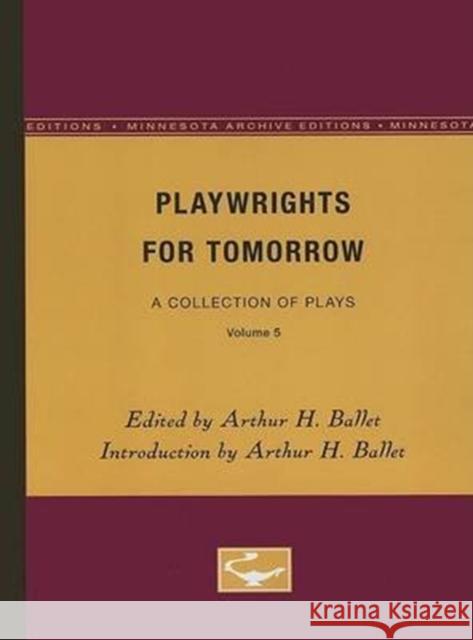Playwrights for Tomorrow: A Collection of Plays, Volume 5 » książka
Playwrights for Tomorrow: A Collection of Plays, Volume 5
ISBN-13: 9780816605354 / Angielski / Miękka / 1969 / 168 str.
Playwrights for Tomorrow was first published in 1969. Minnesota Archive Editions uses digital technology to make long-unavailable books once again accessible, and are published unaltered from the original University of Minnesota Press editions.This is the fifth volume in a continuing series of collections of plays by dramatists who have participated in an experimental program conducted at the University of Minnesota under the auspices of the Office of Advanced Drama Research (O.A.D.R.). Dr. Arthur H. Ballet, editor of the series, is the director of the O.A.D.R.The plays published here are Fair Beckoning One by Sarah Monson Koebnick and The New Chautauqua by Frederick Gaines. In an introduction Dr. Ballet comments briefly on the work of the playwrights included in this volume. Of Mrs. Koebnick and her play, Fair Beckoning One, he writes: "Without intending or implying condescension, it is quite safe to say that Sarah Koebnick is the rarest of all theatre birds: a primitive who is both a skilled writer and a keen observer. Her tradition is not modern, unless Ibsen is still considered a modernist, but her awareness and her ability to create touching characters and situations are qualities seldom evident in what comes into our office. Her play, Fair Beckoning One, is about a century away from the work of a Gaines or a Sainer, but her compassion is very 'with it.'"Of Mr. Gaines and The New Chautauqua he writes: "A graduate-student enterprise, the AnyPlace Theatre, in the summer of 1968 turned Minnesota into a commedia dell'arte territory by carrying plays to the people in the streets. It was, by all measures, enormously successful, and it can be most proud that it presented works of two new writers, with the aid of the O.A.D.R. Fred Gaines is himself a graduate student and an exciting prolific new writer in the theatre. The New Chautauqua is one of his best works (and perhaps one of the best pieces O.A.D.R. has worked with): part commedia, part protest, part entertainment, part commitment, and part sheer, marvelous theatre."











